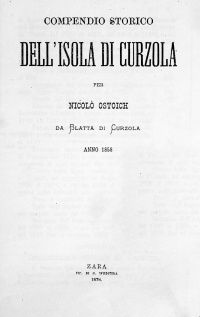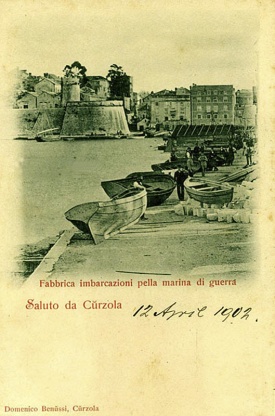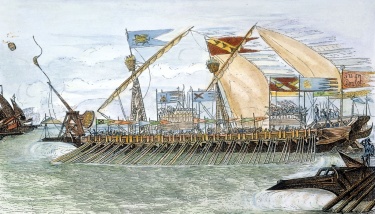Difference between revisions of "Korcula Dialect"
(added File:Korcula Postcard 1902.jpg A Korcula postcard from 1902 in Italian) |
m (tidy) |
||
| Line 196: | Line 196: | ||
Each town and village on the island have their own unique version of the dialect.<ref>[http://books.google.com.au/books?id=T3PqrrnrE5EC&pg=PA145&dq=Korcula+čakavski&hl=en&ei=dIClTYWULISovQOsqLWfCg&sa=X&oi=book_result&ct=result&resnum=4&ved=0CDkQ6AEwAzgK#v=onepage&q&f=false The Formation of Croatian National Identity:] A Centuries-Old dream by Alex J. Bellamy (p145)</ref><ref>[http://en.wikipedia.org/wiki/Korcula#Geography Wikipedia:] Korcula, Vela Luka and Blato and the coastal villages of Lumbarda and Racisce and in the interior Zrnovo, Pupnat, Smokvica and Cara.</ref> The Korčula dialect is found in the local folk music. The local Klape groups (an a cappella form of music) sing using the Korčula dialect. The well know Croatian singer, ''Oliver Dragojevic'', has used the dialect in his music. | Each town and village on the island have their own unique version of the dialect.<ref>[http://books.google.com.au/books?id=T3PqrrnrE5EC&pg=PA145&dq=Korcula+čakavski&hl=en&ei=dIClTYWULISovQOsqLWfCg&sa=X&oi=book_result&ct=result&resnum=4&ved=0CDkQ6AEwAzgK#v=onepage&q&f=false The Formation of Croatian National Identity:] A Centuries-Old dream by Alex J. Bellamy (p145)</ref><ref>[http://en.wikipedia.org/wiki/Korcula#Geography Wikipedia:] Korcula, Vela Luka and Blato and the coastal villages of Lumbarda and Racisce and in the interior Zrnovo, Pupnat, Smokvica and Cara.</ref> The Korčula dialect is found in the local folk music. The local Klape groups (an a cappella form of music) sing using the Korčula dialect. The well know Croatian singer, ''Oliver Dragojevic'', has used the dialect in his music. | ||
[[File:Ostojic's page 1.jpg|thumb|right|200px|Ostojic's page from the '''1878''' issue of his book on the history of the island of Korčula (Curzola).]] | [[File:Ostojic's page 1.jpg|thumb|right|200px|Ostojic's page from the '''1878''' issue of his book on the history of the island of Korčula (Curzola).]] | ||
| − | [[File:Korcula Postcard 1902.jpg|thumb|right|275px|A '''Korcula''' postcard from 1902 in Italian. The last Italian government school was abolished in Korcula on the 13th of September 1876]] | + | [[File:Korcula Postcard 1902.jpg|thumb|right|275px|A '''Korcula''' postcard from 1902 in Italian. The last Italian government school was abolished in Korcula on the 13th of September 1876.]] |
Korčula's old name was Curzola. The island was from 1420 to 1797 part of the ''Republic of Venice''. The Old-Slavic term was Krkar. According to [[Directory:Korcula History|Nikola Ostojic]] (Compendio Storico dell Isola di Curzola) the Greeks named it "Black Corfu" after their homeland and the dense woods on the island. <ref>Historical Compendium of the Island of Korcula by Nikola Ostojic (p.5) | Korčula's old name was Curzola. The island was from 1420 to 1797 part of the ''Republic of Venice''. The Old-Slavic term was Krkar. According to [[Directory:Korcula History|Nikola Ostojic]] (Compendio Storico dell Isola di Curzola) the Greeks named it "Black Corfu" after their homeland and the dense woods on the island. <ref>Historical Compendium of the Island of Korcula by Nikola Ostojic (p.5) | ||
* Corcira Melaena (Greek)</ref> | * Corcira Melaena (Greek)</ref> | ||
Revision as of 07:29, 16 May 2012
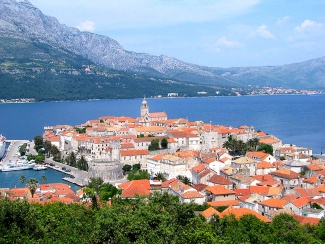
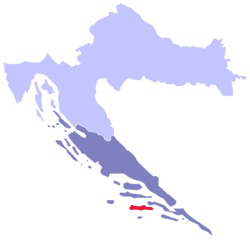
Korcula dialect (or Korčulanski) [1] is a Croatian dialect from the island of Korčula.The island of Korčula lies just off the Dalmatian coast in Croatia.[2] The language base of the Korčula dialect is Chakavian Croatian [3] (it is also intermixed with Shokavian).[4] The dialect has remnants of the extinct Latin Romance language, Dalmatian. The Dalmatian remnants within the dialect have been sometimes referred to as Corzulot.
Additionally it has influences of Venetian.[5] The local dialect is sometimes referred to as Naski or more correctly Naški.[6] The š is pronounced sh. Sir John Gardner Wilkinson, [7] a 19 century English historian, referred to the Dalmatian Slavic dialect as Illirskee.[8]
Examples
Examples of Corzulot words compared with Vegliot, English and Croatian:
Corzulot - Dalmatian Vegliot - English - Croatian [9]
- buža - bus - hole - rupa
- čimitir - chimitier - graveyard - groblje
- dent - diant - teeth - zubi
- faculet - fazuol - handkerchief - rubac
- fatiga - fatica - work - radi
- fermaj - fermai - stop - stoj
- jeloz - golaus - jealous - ljubomoran
- kantat - cantar - to sing - pjevati (Latin: canto)
Encyclopedia Britannica on Vegliot: [10]
| “ | Romance language formerly spoken along the Dalmatian coast from the island of Veglia (modern Krk) to Ragusa (modern Dubrovnik). Ragusan Dalmatian probably disappeared in the 17th century. The Vegliot Dalmatian dialect became extinct in the 19th century. | ” |
Additional examples of words from the Korcula dialect of Croatia
(Korčula dialect - English - Croatian)
Template:Col-break- adio - goodbye - doviđenja
- afitat - rent (Venetian:afìt)
- aimemeni - poor me or oh dear
- alavia - done properly or it's Ok! - u redu
- apoteka - pharmacy (Venetian: apoteca)
- arbol - ship's mast (In Venetian it means tree)
- aria - air - zdrak (Venetian: aria)
- arma - armed (Venetian: arma)
- avižat [11] - to arrive - došao
- baleta - bullet - metak (Venetian: bal)
- banda - side - strana (In Venetian it means side & flank)
- balun - football (Venetian: balón)
- banak - bench (Venetian: banca) [12]
- baraka - shed or shack (Venetian: baràca)
- barba - uncle - stric (Venetian: barba)
- barilo - barrel (Venetian: barìla)
- barka - type of local boat (Venetian: bàrca)
- bat - a type of hammer (Venetian: batu meaning to strike)
- bevanda - wine with water - vino sa vodom (Venetian: bevànda "watery wine")
- beštija - animal - životinja (Latin: bestia also beast)
- beštimat - swear (Venetian: bestiemàr)
- bičve - socks - čarape
- bićerin - small glass (Venetian: bicér "glass")
- Brigela - local nickname (Venetian: brighela joker)
- bobon - lolly
- boca - bottle - flaša (Venetian: boca)
- bonaca - the sea is dead calm (Venetian: bonàça)
- botilja - bottle (Romance Dalmatian: botaila)
- botun - button (Romance Dalmatian: botaun)
- bravo - well done
- buka - noisy (Romance Dalmatian: mouth)
- bukva - herring
- bura - local wind
- butiga - shop
- buža - hole - rupa (Venetian: bus or buxa)
- cilo - wine without water - vino bez vode
- cukar - sugar - šečer (Venetian: sucaro)
- čakule - gossip
- čagalj - jackal
- čorav - blind (Venetian: ciòro "blind person")
- damižana - a netted bottle
- daž - rain - kiša
- Dreto - straight (Romance Dalmatian: drat)
- Defora in old Venetian means "from the outside".
- Di greš?- Where are you going?
- faca - face - lice (Venetian: faca)
- fabrika - factory - tvornica (Latin: fabrica- manufacture or to craft, trade, art, trick, device)
- fabrikat - to trick
- falso - fake (Venetian: falso "liar")
- feral - a gas or petroleum lamp for attracting fish (night fishing). Also in Venetian feral means "lamp".
- fermai - stop - stani
- feta - slice (Venetian: feta)
- figura - figure (Venetian: figura)
- forma - shape (Venetian: forma)
- fraja - to go out and have a good time (Venetian: fraja-happy company or happy bunch)
- frigati - to fry (Romance Dalmatian: fregur)
- forca - power (apply with strength)
- fortuna - strong wind
- fratar - priest (Latin: frater meaning brother)
- fuga - gap (Latin: flight, escape)
- fumar - chimney (Venetian: fuma meaning smoke)
- fumati - smoking - pušiti
- furešti - foreigner - stranac
- gira - a fish from Croatia.
- griža - a form of very hard stone
- gundula - type of boat
- gusti - enjoyment (Venetian: gusto-pleasurable)
- gusto - thick
- gustrina - underground rainwater reservoir
- guzica - bottom
- hoča - lets go
- izilo - eaten
- kadena - chain (Romance Dalmatian:kataina)
- kajić - type of local boat
- Kalafat - means masters (shipyard workers) who filled the fissures between boards on a wooden boat.
- kamara - bedroom - soba (Latin: camera-vault, vaulted room)
- kantat - to sing - pjevati (Latin: canto)
- kapula - onion - luk (Romance Dalmatian: kapula)
- karoca - small carriage (Venetian: carosa)
- katrida - chair - stolica (Romance Dalmatian: katraida)
- katun - corner (Latin: cantus)
- klapa - an a cappella form of music [13] (Venetian:clapa "singing crowd")
- koltrine - curtains
- kontra - against - protiv (Latin: contra)
- korač - hammer
- kormilo - rudder
- kurijozan - curiosity
- kužin - cousin - rođak (Venetian: cuxìn)
- lacun - bed sheets
- lapis - pencil - olovka (Venetian: apis)
- lavadin - washbasin (Venetian: lavandin)
- lešada - a type of fish soup (boiled)/ Lesada in Venetian means boil.
- leut - type of local boat
- levant - local wind
- libro - book - knjiga
- licenca - licence - dozvola (Venetian: icenca)
- lipo - nice or beautiful - ljepo
- maistral - local wind
- makina - machine
- Malandrin - Local nickname. In Venetian it means: dishonest or crook
- mat - mother - majka
- Maragun - wood worker (Venetian: Marangòn)
- mapa - map (Venetian: mapa)
- meća - to throw
- mezo - in between (Venetian: mèzo "half")
- mlinko - milk
- motika - local agricultural tool
- mudante - underwear (Venetian: mudande)
- noštromo - boatswain
- parića - to prepare
- pamidora - tomato (Italian pamidore)
- pandur - policemen - policija (Venetian: panduro)
- papit - this word is used when feeding a child - jedi djete (Venetian: papa-means baby food)
- perun - fork (Venetian: pirón from Greek: pirouni)
- piat - plate
- pikolo - small, little (Venetian: picolo)
- Pelišac - Pelješac (other names used: Stonski Rat, Puncta Stagni, Ponta di Stagno and Sabioncello)
- pirula - pill - tableta (Venetian: pirola)
- pistun - piston (Venetian: piston)
- pitura - paint (Venetian: pitura-painting)
- poć na ribe - going fishing - ići na ribanje
- Pola[14] - Pula (A city in today's modern Croatia)
- postoli - shoes - cipele
- postelja - bed
- potato - potato - krumpir
- punistra - window (Latin: fenestra)
- rič - word
- ritko - not often
- setemana - week - tijedan (Venetian: setemana)
- spim - I'm sleeping
- skula - school - škola
- soldi - money - novac (Latin: solidus)
- soto - underneath - ispod (Venetian: sot or soto)
- šestan - attractive or good looking (Venetian:sesto-grace, well mannered)
- šija - reverse - natrag
- šiloko - local wind (Venetian: siròco)
- škoj - island - otok
- škver - shipyard - brodgradilište
- špirit - spirit
- šporko - dirty (Venetian: spórco)
- štrada - street - ulica
- šufit - attic or loft (Venetian: sofìta)
- šugaman - beach towel
- tata - father - otac
- torta - a type of cake (Venetian: torta)
- tavajol - tablecloth (Venetian: toaja)
- temple or timpre - temple (anatomical)
- terpeza - table - stol
- ura - hour - jedan sat
- vapor - ferry - trajekt (Venetian: Bapor meaning steamship)
- vara vamo - move on
- vedro - clear sky
- vijaž (or vijaz) - meaning a sailors tour
- vrime (or brime) [15] - weather - vrijeme
- Vi ga niste vidili - You did not see him.
- zeje - local dish
- zrcalo - mirror - ogledalo
Each town and village on the island have their own unique version of the dialect.[16][17] The Korčula dialect is found in the local folk music. The local Klape groups (an a cappella form of music) sing using the Korčula dialect. The well know Croatian singer, Oliver Dragojevic, has used the dialect in his music.
Korčula's old name was Curzola. The island was from 1420 to 1797 part of the Republic of Venice. The Old-Slavic term was Krkar. According to Nikola Ostojic (Compendio Storico dell Isola di Curzola) the Greeks named it "Black Corfu" after their homeland and the dense woods on the island. [18]
Note: The last Italian language government school was abolished in Korčula (Curzola) on the 13th of September 1876.[19][20]
- Information below taken from Beginnings of Formal Education - Vela Luka:
| “ | Italian language was not only the official language in all public Dalmatian establishments, but also was the spoken language in a significant number of white-collar, civil service and merchant families in the cities and major markets within towns [21] | ” |
- From the late 19th century onwards the old Dalmatian culture has been all but disappearing from the region.
Additional History
Arneri Lords of Korcula
Historic quote taken from Researches on the Danube and the Adriatic written by Andrew Archibald Paton in 1861. Chapter 4 - The Dalmatian Archipelago on page 164.
- Signor Arneri from the town of Korčula stated to Andrew Archibald Paton:
| “ | These three pears you see on the wall," said he, "are the arms of my family. Perussich was the name, when, in the earlier part of the fifteenth century, my ancestors built this palace; so that, you see, I am Dalmatian. All the family, fathers, sons, and brothers, used to serve in the fleets of the Republic (Editors notes: Republic of Venice); but the hero of our race was Arneri Perussich, whose statue you see there, who fought, bled, and died at the Siege of Candia,[22] whose memory was honoured by the Republic, and whose surviving family was liberally pensioned; so his name of our race. We became Arneri, and ceased to be Perussich [23][24] | ” |
Andrew Archibald Paton (1811-1874) was a British diplomat and writer from the 19 century he visited Korčula in the early 1860s.
Canon Pietro Casola's Pilgrimage to Jerusalem
- Below is Pietro Casola writing about Korčula (Curzola) in 1494:
| “ | On Friday, the 13th of June, we left the canal of Lesina (Hvar-Editors note) after sunrise and made sail with a very slight wind ; but as the day advanced the wind improved and we came opposite the citadel of Curzola (Note 58), which is beautiful to look at from the outside. The captain did not wish to stop there for fear of losing the favourable wind, and thus we passed by, and could only admire the place from the outside; it is said to be sixty miles from Lesina. The captain related that a few years ago King Ferdinand, the former King of Naples, sent his fleet there to pry and steal it from the Venetians, but he failed completely because the people of Curzola were valiant, and defended themselves from that attack without additional help from the Signoria of Venice, to whom they are subject. (p171) | ” |
| “ | Curzola: Reached Curzola, (1.) a citadel in Dalmatia, and as bright and clean as a beautiful jewel. It has no drawbridges, but it has strong walls, and it will be stronger still when a wall is finished which has been begun towards the sea. At first sight the said citadel appears to be flat, but one perceives on entering it that all the streets ascend a little. The streets are narrow and dark, but they are paved with stones. The city is built on a rock. Many of the houses are built in the modern style and are handsome enough for a great city. They are built of white stone like marble and sculptured. It was a marvel to me to see so many beautiful houses in that place. The Cathedral Church, considering its importance and also that of the city, is beautiful. It is entirely built of beautiful squared stones.
The choir is beautiful and the church is well served. The said citadel is full of people. The men dress in public like the Venetians, and almost all of them know the Italian tongue. When I asked the reason, was told it was because they often go to Venice. Their women cannot fear the cold. They go about with their chests and shoulders entirely uncovered from the breasts upwards,and they arrange so that their breasts hold up their clothes and prevent them from falling down on to their feet. The place seems to me poor in everything save wine, which is abundant and good. The island is not much cultivated because the greater part of the men are galeotti and continually at sea. Most of the pilgrims landed, thinking to find a good supper. But there is no fish to be had there, although he place is in the midst of the sea, no eggs, no cheese. There was hot bread, for, as soon as the people heard of the arrival of the galley, every man ran to make bread in order to earn a little money; it was good, and so was the wine. There were dried figs and also some raisins, but everything was dear. We stayed there until the following morning, every man being warned, however, that if he wanted to come further, he must sleep on board the galley. Certain Ragusans remained behind and some friars who wished to return to Ragusa (Dubrovnik-Editors note), which we had passed by owing to the force of the wind. On Saturday, the 18th of October, which was the festival of Saint Luke the Evangelist, we left Curzola. Only one sail, the terzarola, was spread, because there was a very high though favourable wind — that is, the scirocco, and with the said sail alone we made, according to the estimate of the mariners, fifteen miles an hour.
|
” |
| “ | Note 58: Curzola. The battle referred to by Casola took place in August, 1483. During the war between Venice and Ferrara (1482 — 1484), King Ferdinand of Naples, in support of his son-in-law the Duke of Ferrara, sent a fleet against Curzola. It was defeated by the inhabitants under Giorgio Viario, the then Count or Governor. (p377) [25][26] | ” |
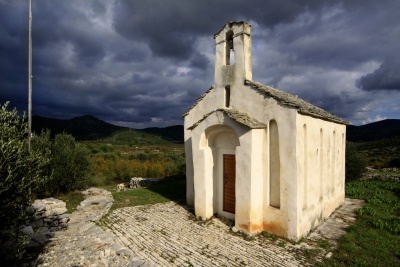
See also
- Korcula History (Historical Compendium of the Island of Korcula)
- The Cultural and Historical Venetian Presence in Dalmatia-Croatia
- Korcula History 2
- Korčulanski Dijalekt
- Korcula and Italian Wikipedia
- Vallegrande Speak
Notes and References
- ^ The č is pronounced ch.
- ^ John Everett-Healu. "Dalmatia." Concise Dictionary of World Place-Names. Oxford University Press. 2005. Encyclopedia.com
- ^ Editors note: Slavic tribes invaded the region of Roman Dalmatia in the early Middle Ages. Prior to the arrival of the Slavs, Roman Dalmatia was mainly inhabited by a Roman Latin-Illyrian population. Recent DNA studies have stated that more than three quarters of today's Croatian men are the descendants of Europeans who inhabited Europe 13 000-20 000 years ago (prior to the arrival of the Slavs). The first primary source (factual-that its authenticity isn't disputed) to mention the Croatian-Hrvat identity in the Balkans was Duke Branimir (Latin: "Branimiro comite dux cruatorum cogitavit" c. 880 AD). Branimir was a Slav from Dalmatia. Hrvat or Horoúathos are names of Sarmatian origins. In 1853 a Russian archaeologist Pavel Mikhailovich Leontjev discovered the Tanais Tablets. The Tanais Tablets mention three men: Horoúathos, Horoáthos, and Horóathos (Χορούαθ[ος], Χοροάθος, Χορόαθος). They are written in Greek and are from the 3rd century AD from the city of Tanais, today's Azov, Russia. At that time the region had a mixed Greek - Sarmatian population. The term Slav was first used by the Byzantines (i.e. Procopius-Byzantine scholar, Jordanes- 6th century Roman bureaucrat) and was recorded in the 6th century (cia. 550) in Greek (Σκλαβῖνοι-Sklabenoi). Later in Latin it was written Sclaveni.
- ^ The Land of 1000 Islands by Igor Rudan
- "However, the clashes between the Ottoman Empire and Venetian Republic produced extensive migrations from the mainland areas, especially from today's Bosnia and Herzegovina, to the eastern parts of the islands of Brač, Hvar, Korčula, and Pag. The newcomers brought their gene pool and a variety of cultural specificities, including the “Shokavian” dialect of the Croatian language to the predominantly “Chakavian” area. The most extensive migrations to these islands occurred during the Cypriote (1571-1573), Candian (1645-1669), and Morean wars (1684-1699). The newcomers were given land and awarded special privileges “The Paštrović Privileges”."
- ^ Concerning the Number of Italians/Pro-Italians in Dalmatia in the XIXth Century by Šime Peričić
- "It is true, then a small colony of Italians where in Sibenik, on the island of Korcula, Hvar and Vis, and other places of the province."
- ^ Note: Naški means "ours" thus meaning "our language" in Croatian.
- ^ Dalmatia and Montenegro: With a Journey to Mostar in Herzegovina by Sir John Gardner Wilkinson. (p33)
- Sir John Gardner Wilkinson (October 5, 1797 – October 29, 1875) was an English traveller, writer and pioneer Egyptologist of the 19th century. He is often referred to as "the Father of British Egyptology".
- ^ Illyricum was a Roman province named after one of the Indigenous groups in the region.
- ^ Wikipedia: Dalmatian language
- ^ Encyclopedia Britannica: History & Society-Vegliot Dalmatian
- ^ The ž is is pronounced zh.
- ^ Venetian-English English-Venetian: When in Venice Do as the Venetians by Lodovico Pizzati (p19)
- ^ The traditional Klapa was composed of up to a dozen male singers (in recent times there are female Klape groups). Klapa singing dates back centuries. The arrival of the Slavic-Croatians to Dalmatia and their subsequent settlement in the area, began the process of the cultural mixing of Slavic culture with that of the traditions of the Roman population of Dalmatia. This process was most evident in the coastal and island regions of Dalmatia. In the 19th century a standard form of Klapa singing emerged. Church music heavily influences the arrangements of this music giving it the musical form that exists today.
- ^ Korcula.NET History index -Jerko Didović Rade Diary 1892-94 (A Sailor the from island of Korcula)
- ^ Korcula.NET History index -Jerko Didović Rade Diary 1892-94 (A Sailor from the island of Korcula)
- ^ The Formation of Croatian National Identity: A Centuries-Old dream by Alex J. Bellamy (p145)
- ^ Wikipedia: Korcula, Vela Luka and Blato and the coastal villages of Lumbarda and Racisce and in the interior Zrnovo, Pupnat, Smokvica and Cara.
- ^ Historical Compendium of the Island of Korcula by Nikola Ostojic (p.5)
- Corcira Melaena (Greek)
- ^ The Italians of Dalmatia by Luciano Monzali (p83)
- ^ Editor's Note: The island of Korcula was part of the Austro-Hungarian Empire (1815 to 1918). It was was part of the Kingdom of Dalmatia. In the neighbouring Kingdom of Croatia-Slavonia a Croatian nationalistic movement was established and alongside that, within the Balkan region a Pan-Slavic movement was growing (the beginnings of the ill fated Yugoslavia). These political on goings started to be felt in the Kingdom of Dalmatia. The Austrians in the 1860s started to introduce (a process of Croatisation) within the Kingdom of Dalmatia a standardised Croatian language sometimes referred to as Illirski. It then replaced Italian altogether. In effect the government undertook culture genocide. For centuries the Italian language was the official language of the Dalmatian establishment. It was also the spoken language in white-collar, civil service and merchant families.Privately Italian schools were still being run in the Kingdom of Dalmatia, i.e the city of Zadar.
- ^ The Early Beginnings of Formal Education - Vela Luka (beginnings of literacy and Lower Primary School 1857 – 1870) (p.8 written in Croatian)
- ^ The Siege of Candia (modern Heraklion, Crete) was a military conflict in which Ottoman forces besieged the Venetian ruled city and were victorious. Lasting from 1648 to 1669, it is considered by some to be the longest siege in history.
- ^ Researches on the Danube and the Adriatic: by Andrew Archibald Paton. Chapter 4. The Dalmatian Archipelago. (p164)
- ^ Otok Korčula (2nd edition) by Marinko Gjivoje, Zagreb 1969.
- Here is a perfect example of a Slavic family surname becoming later Venetian in character. According to Marinko Gjivoje, Perussich in modern Croatian is Piruzović. The book outlines A-Z about the island of Korcula, from traditions, history, culture to wildlife, politics & geography. (p46-p47)
- ^ Canon Pietro Casola's Pilgrimage to Jerusalem In the Year 1494 by Pietro Casola (p171, p327, p328, p377)
- ^ Canon Pietro Casola's Pilgrimage to Jerusalem in the Year 1494 by Pietro Casola - www.archive.org (Note 58 on p377)
- ^ Korčula City and Island by Alena Fazinić, Stanka Kraljević & Milan Babić
External Links
- Photo link for a aerial view of Korcula Town
- Korcula Info
- Vela Luka-Mediterano
- Oliver Dragojevic-Official Web Site
- Wikipedia: Battle of Curzola
- Arneri-Web Site
- Government of the Republic Croatia - Official Web Portal
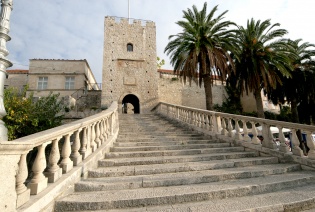
<sharethis />
Korcula Korčula Korčulanski Directory:Korcula History Korcula History Corzulot Korzulot Croatian dialect Dalmatian Venetian Latin Klapa Korcula town Vela Luka Blato Lumbarda Racisce Zrnovo Pupnat Smokvica Cara Croatia Dalmatia Korcula Korčula Dalmatia Korčulanski Korčula Dialect Dalmatian Language Arneri Lords of Korcula
